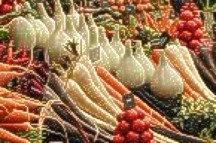Backfill
Tell Me More
by Derek Burch
Biting the hand of the industry that feeds me

A recent "Viewpoint" piece with this title (Tell Me More) in
the August issue of The Garden (that excellent monthly publication
of The Royal Horticultural Society) encourages me to be rude, yet again,
about two of my favourite targets: garden journalists, and garden shops.
Sitting targets both, but worth another dose of shot: they bring it on
themselves.
Graham Strong takes issue with the practice, on plant labels and in garden writing, of giving only the positive features of a plant. As he says, "Plants are a dream product that sell on sight." But, he asks "Would we be so besotted if a little later we find that our blue poppy dies straight after flowering, sawfly caterpillars reduce our Solomon's seal annually with surgical precision to stems and midribs, and, as last winter has proved, cordylines are a martyr to frost."
It is not just susceptibility to a particular pest that writers or retailers should be warning us about. As Mr. Strong says " It isn't only pests and diseases that lie in wait to trap the uninitiated. Who hasn't been caught out by growth rates and ultimate heights and spreads? 'Spreads freely' can sometimes be interpreted as 'don't let it out of its pot at any price.' Rampant species ... should come with a public health warning'."
It wouldn't be necessary to denigrate a plant about which we write - after all no-one selling a suburban house (say a perfectly nice two up and two down semi-,or a 3/2 ranch-style), is going to say about it "not the Taj Mahal," but we would at least expect to know if it has the deathwatch beetle in its timbers or is built on a toxic waste site.
Labeling on plants could be much better. The condensation of information into a set of symbols is an interesting exercise for the author, but very difficult for the gardener to follow since there is no universal standard for the little pictures (which I suppose I must learn to call "icons" in deference to our enforced familiarity with the computer). Better perhaps for the garden store to group their plants according to their light or water needs, and to use the space on the label to suggest companion plants, or give any dire warnings that may be necessary.
I was going to suggest that the garden store could supplement the label information in a way to make it meaningful, but this would require that the sales force, or at least the managers, were familiar with the plants. At the very least it would require that they know the names of the plants and could look them up in a reference book to share the information. And would also require that they own a reference book. But there we come full circle: so many of the books available just don't do their job, hiding the author's lack of knowledge behind glorious pictures and gushing praise for the plants. To quote Mr. Strong again " We seem to be overwhelmed by a tide of breathless enthusiasm. Every plant is described as 'stunning' or 'exquisite'.... Could it be that it is easier to heap praise than actually to have grown it and be able to balance its obvious assets with any failing?"
So many of our garden writers in the United States are garden journalists, rather than authors who share their personal involvement in gardens in a way that sweeps the reader up (what I call 'Go thou and do likewise" writing), but paints a true picture of the plant or the process described. There are the exceptions who have gardens (read Georgia Tasker's book Enchanted Ground if you want to understand South Florida gardening), just as there are great owners and managers of garden shops, but they are lonely figures. These people deserve our support and custom, rather than any store in which there are dry or unlabeled plants. Gardeners deserve to be told what they need to know - let's start to withhold patronage from the stores that fail us, and start telling the owners why we are shopping elsewhere. It wouldn't hurt to write to publishing companies, too, to tell them why a book of theirs misleads. Avoiding the publishing of second-rate books is what editors are for, and they need to pass scrutiny just as much as the authors.
Complain about me to my publisher at derek@horticulturist.com
Back to Table of Contents